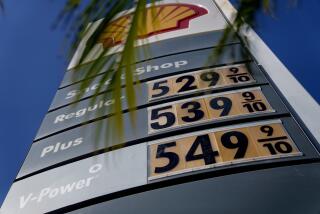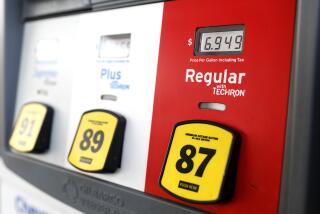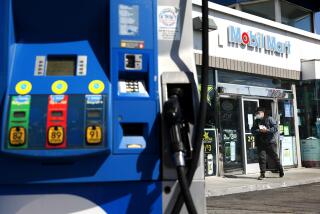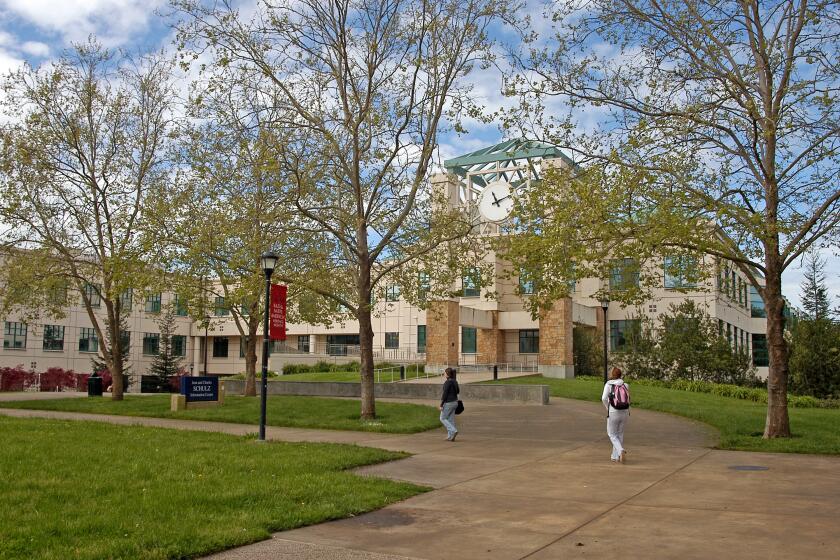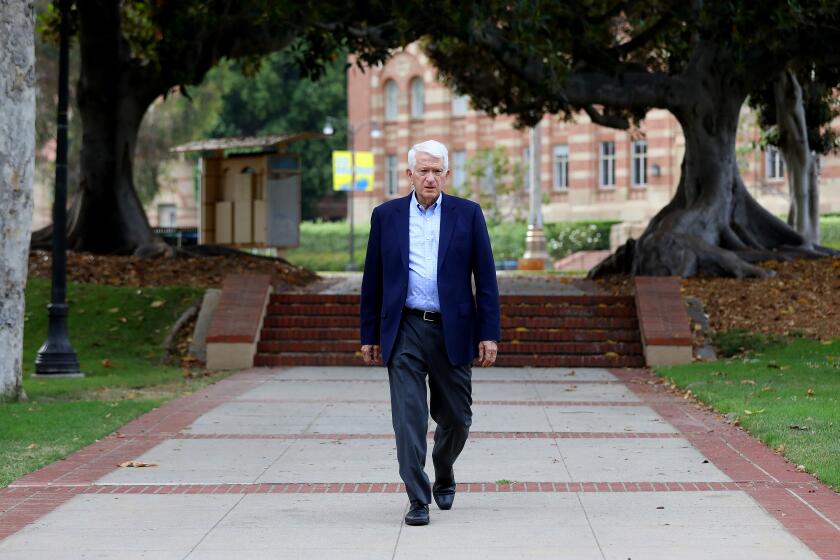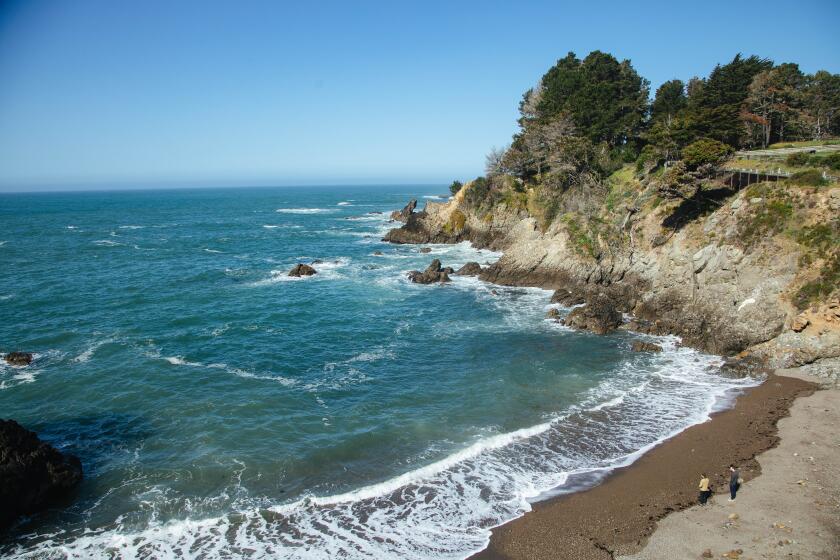City Seeks to Prevent Gas Station Closures : Economy: Rancho Palos Verdes considers an ordinance that would make it harder for oil companies to sell profitable outlets.
Rancho Palos Verdes officials are taking on the big oil companies to prevent them from closing the few full-service gasoline stations left in the city.
The oil companies have closed at least half a dozen of these stations in recent years, leaving just seven open, and one of those is slated to close.
Not only are these stations a source of tax revenue for this financially strapped bedroom community, they also are locally owned, service-oriented businesses that have become a traditional part of the city. Without them, residents say they would have to hunt for auto service and repairs down off the hill in Torrance or other South Bay cities.
“We are very concerned about the disappearance of these stations,” City Manager Paul Bussey said.
In an effort to head off more closures, city officials are considering a law that would make it harder for oil companies to close stations that are making a profit. But, city officials acknowledge, they may be outgunned in the battle.
“We don’t know exactly what the city can do to stop the big oil companies, but we want to save these stations,” said Carolynn Petru, city planning director.
Petroleum industry representatives explain that in the fast-paced, competitive world of big oil, the era of the traditional neighborhood service station has ended--by popular demand.
Small, service-oriented stations pump only 40,000 to 50,000 gallons of gasoline a month, not enough to measure up to the high-volume, low-price, minimal-service marketing goals set by the corporations. Experts say the oil companies prefer that a station pump at least 150,000 gallons a month.
“The average consumer is looking for the lowest price . . . and is willing to give up some services to get it,” said Edward G. Reilly, a senior vice president at Arco. And that means fewer but larger stations where customers pump their own gasoline.
The trend toward high-volume stations is statewide. There are just 11,600 stations in California now, compared to 22,000 in 1973. And reports show that Southern California has only 4,616 gasoline outlets, down by half in two decades.
Unocal alone is closing 300 stations in California, including several on the Palos Verdes Peninsula. One of the four Unocal stations in Rancho Palos Verdes already has closed and a second is being forced out of business, city officials report.
Texaco and Chevron also have closed stations in the city. City officials say the old stations either remain vacant or are sold for other uses.
Roger Beach, Unocal’s chief operating officer, lives in Rancho Palos Verdes and trades at the Unocal station that is scheduled to close when its lease expires in October, 1993. He recently told city officials that Unocal must close these “under-performing stations” if the company is to remain “economically viable.”
The outlet Beach uses pumps 50,000 gallons a month and grosses about $1 million a year, according to Jim Juneau, 40, operator of the station at 5656 Crest Road. Like many other station operators, Juneau is an independent dealer who leases the property from brand-name gasoline suppliers.
Juneau said he has operated the station profitably for 14 years, and he noted that many of his customers are Beach’s neighbors.
“They don’t explain why they aren’t willing to renew the lease, they just say you don’t fit into their marketing plan,” Juneau said.
Traditionally, oil companies make their profits from gasoline sales and station rents. Operators like Juneau say they make relatively little from the gas pumps; most of their profits are made in the service bays where they service and repair cars.
Juneau contends that Unocal makes plenty of money as his landlord.
“I pay $5,000 a month rent,” he said. That comes to $60,000 a year on real estate worth $400,000, a 15% return on investment.
Unocal would not comment on the specifics of any one case. A company spokesman agreed that a station’s operator might be making a profit but noted that Unocal bases its decisions on other factors, like total volume pumped and land values.
“We must ask ourselves if a service station is the best use for that piece of property,” Unocal spokesman Jim Bray, said.
Councilwoman Susan Brooks, who is leading the fight to save the stations, called the oil companies’ attitudes “ruthless.”
In addition to the services they provide, she said the stations each pay $7,000 to $10,000 a year in sales tax and bring in thousands more in gas tax.
City Council members are studying a San Francisco law that makes it illegal to close a station unless it is not earning a “fair rate of return” for its owner.
A similar ordinance was aired publicly for the first time by the Planning Commission earlier this month. Despite strong support from service station operators and their customers, the commission balked at endorsing the idea, saying the city should not be the one to decide if a business is profitable. They also were concerned because San Francisco is having trouble enforcing its ordinance.
Petru noted that the San Francisco law is so complex it is proving to be unworkable, and that it has failed to prevent a dozen stations from closing.
In the meantime, Rancho Palos Verdes planners are drafting changes for the General Plan to enable land where gas stations are located to be rezoned for commercial use. These changes would make it easier for the current operators like Juneau to buy the stations from the oil companies when their leases expire, Petru said.
As it now stands, because the stations were built before the city was incorporated in 1973, the stations sit on land zoned for residential use. The stations are legally tolerated under a “nonconforming” use permit, but only until a station closes.
If an oil company sells a station to an operator, the company is legally bound to clean up any hazardous or toxic contamination at the site. This can mean removing the underground storage tanks and cleaning up the pollution, which can take years.
If the cleanup takes more than three months, current city ordinances require that the land revert to residential use. City planners want to amend the General Plan by designating the seven station locations for commercial use, which would give local operators time to reopen the stations if they are bought from the oil companies.
One Unocal operator, Steve Saporito, 30, recently negotiated a $425,000 purchase price for his station in the city, he said.
“At least that will make it easier for people like Steve Saporito and Juneau to buy their stations and stay in business,” Petru said.
More to Read
Start your day right
Sign up for Essential California for news, features and recommendations from the L.A. Times and beyond in your inbox six days a week.
You may occasionally receive promotional content from the Los Angeles Times.
